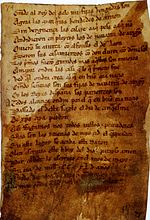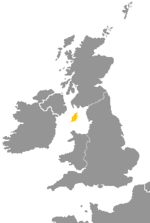inflected prepositions can develop from the contraction of a preposition with a personal pronoun; however, they are commonly reanalysed as inflected words...
8 KB (772 words) - 00:17, 18 November 2024
Adposition (redirect from Preposition)
are exceptions, though, such as prepositions that have fused with a pronominal object to form inflected prepositions. The following properties are characteristic...
44 KB (5,561 words) - 03:21, 25 October 2024
redundant con was prefixed to these forms. Compare the concept of inflected preposition. Ven conmigo y con él ahora = "Come with me and him now." Iré a...
17 KB (2,448 words) - 09:56, 12 August 2023
*le iad "with them" are incorrect. Such prepositions have conjugated forms, like verbs (see Inflected preposition). The following table presents some commonly...
51 KB (4,402 words) - 12:20, 23 March 2024
Breton language (section Inflected prepositions)
languages, Breton pronouns are fused into preceding prepositions to produce a sort of inflected preposition. Below are some examples in Breton, Cornish, Welsh...
90 KB (7,211 words) - 22:43, 21 November 2024
Preposition stranding or p-stranding is the syntactic construction in which a so-called stranded, hanging or dangling preposition occurs somewhere other...
32 KB (3,745 words) - 22:08, 6 November 2024
Modern Hebrew grammar (section Inflected prepositions)
pronouns. If the object of a preposition is a pronoun, the preposition contracts with the object yielding an inflected preposition. דִּבַּרְנוּ עִם דָּוִד...
86 KB (7,628 words) - 15:30, 17 November 2024
Inflection (redirect from Inflected)
lead", the word lead is not inflected for any of person, number, or tense; it is simply the bare form of a verb. The inflected form of a word often contains...
62 KB (6,185 words) - 15:45, 20 October 2024
English prepositions are words – such as of, in, on, at, from, etc. – that function as the head of a prepositional phrase, and most characteristically...
36 KB (4,518 words) - 19:41, 22 November 2024
Fusional language (redirect from Inflected languages)
Fusional languages or inflected languages are a type of synthetic language, distinguished from agglutinative languages by their tendency to use single...
10 KB (1,091 words) - 08:13, 31 July 2024
language, are not typical for Indo-European, such as the presence of inflected prepositions and the initial consonant mutations. Irish syntax is also rather...
31 KB (2,153 words) - 04:56, 6 November 2024
Westphalia, form a continuous aspect using the verb sein (to be), the inflected preposition am or beim (at the or on the), and the neuter noun that is formed...
41 KB (4,787 words) - 15:05, 13 August 2024
Colloquial Welsh morphology (section Prepositions)
Gaelic, Manx, Cornish, and Breton. Welsh is a moderately inflected language. Verbs inflect for person, number, tense, and mood, with affirmative, interrogative...
48 KB (4,810 words) - 12:37, 17 November 2024
Postpositive adjective (redirect from Prepositive adjective)
general, queen regnant, or all matters financial. This contrasts with prepositive adjectives, which come before the noun or pronoun, as in noun phrases...
24 KB (2,790 words) - 19:36, 28 June 2024
(pang-urì), prepositions (pang-ukol), conjunctions (pangatníg), ligatures (pang-angkóp) and particles. Tagalog is an agglutinative yet slightly inflected language...
73 KB (7,563 words) - 05:08, 22 November 2024
Schrijver 1995) point to shared innovations among these – chiefly: inflected prepositions shared use of certain verbal particles VSO word order differentiation...
24 KB (2,452 words) - 14:04, 3 November 2024
English ones, are inflected in terms of comparison by adding '-ere'/'-are' (comparative) or '-est'/'-ast' (superlative). In inflected forms of adjectives...
18 KB (2,514 words) - 01:40, 28 August 2024
Portuguese grammar (section Prepositions)
Portuguese grammar, nouns, adjectives, pronouns, and articles are moderately inflected: there are two genders (masculine and feminine) and two numbers (singular...
65 KB (7,437 words) - 12:37, 29 October 2024
Manx language (section Prepositions)
languages, Manx has inflected prepositions, contractions of a preposition with a pronominal direct object, as the following common prepositions show. Note the...
123 KB (8,733 words) - 13:42, 14 November 2024
Breton grammar (section Prepositions)
or may not inflect for person, number and gender. Historically, inflected prepositions derive from the contraction between a preposition and a personal...
35 KB (2,098 words) - 08:54, 1 September 2024
Literary Welsh morphology (section Prepositions)
interrogative and negative conjugations of some verbs. A majority of prepositions inflect for person and number. There are few case inflections in Literary...
48 KB (4,019 words) - 02:14, 8 November 2024
Manx grammar (section Prepositions)
Indo-European languages. These include initial consonant mutation, inflected prepositions and verb–subject–object word order. Manx nouns fall into one of...
34 KB (2,310 words) - 10:13, 26 April 2024
the lenited form of ⟨b⟩. leat is the second person singular inflected form of the preposition le. The order is verb–subject–object (VSO) in the second half...
68 KB (5,732 words) - 20:01, 31 October 2024
(e.g., turn down, run into, or sit up), sometimes collocated with a preposition (e.g., get together with, run out of, or feed off of). Phrasal verbs...
25 KB (3,101 words) - 07:14, 23 November 2024
otherwise govern a pronoun, the prepositions are inflected for person, number, and in the third person singular, gender. Prepositions that take either the dative...
124 KB (10,920 words) - 18:06, 25 June 2024
Cornish language (section Prepositions)
such as bos 'be' or gul 'do'. Cornish uses inflected (or conjugated) prepositions: Prepositions are inflected for person and number. For example, gans (with...
129 KB (13,346 words) - 00:05, 20 November 2024
and in some contexts be a preposition but a conjunction in others, depending on the syntax. For example, after is a preposition in "he left after the fight"...
23 KB (2,484 words) - 14:06, 13 November 2024
uninflected words include prepositions, interjections, and conjunctions, often called invariable words. These cannot be inflected under any circumstances...
3 KB (375 words) - 21:08, 13 June 2022
[ɲ]. Taa is a subject–verb–object language with serial verbs and inflecting prepositions. Genitives, adjectives, relative clauses, and numbers come after...
33 KB (3,052 words) - 11:57, 21 September 2024
que is used as the object of a preposition, the definite article is added to it, and the resulting form (el que) inflects for number and gender, resulting...
18 KB (2,520 words) - 15:27, 7 August 2024







